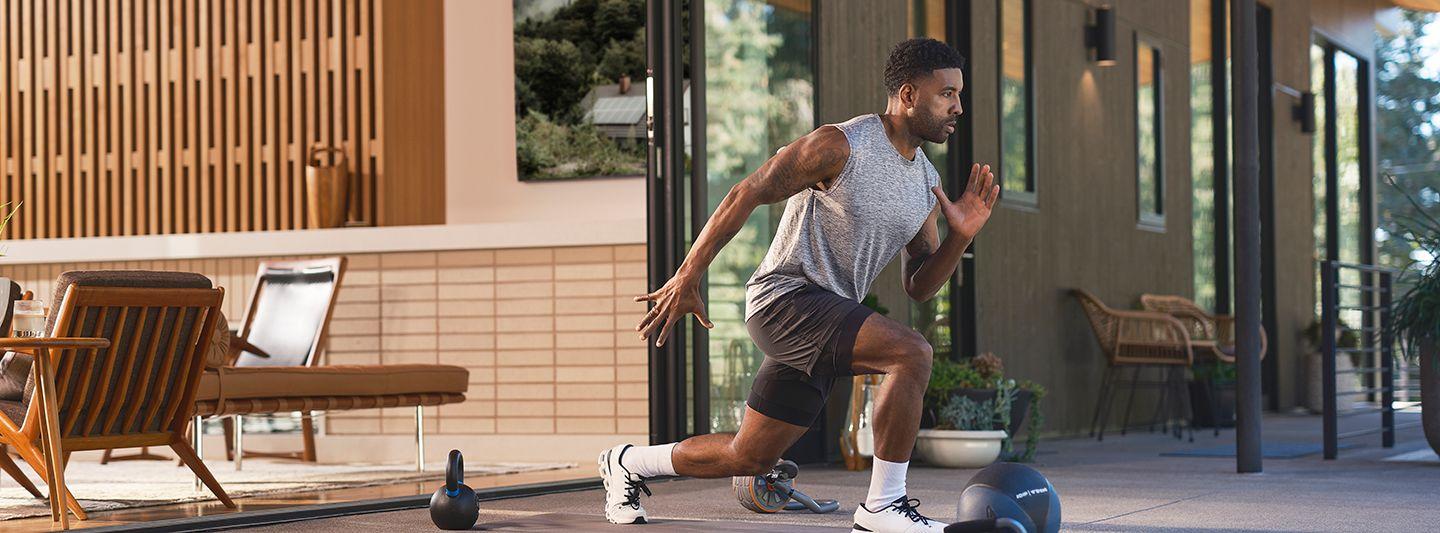Boosting your energy levels with glucose management
Can managing your glucose levels help boost your energy? We share practical steps to increase energy levels and gain energy fast when feeling tired.
Emily Shiffer,
Contributing Writer
Andrea Givens, MS, RD, CSSD,
Medical Affairs
Published:
February 24, 2025
Updated:
April 11, 2025
Read time:
7 minutes

Maintaining balanced blood glucose is one important way to increase energy levels and prevent fatigue.
When tired, you can instantly boost your energy by getting in a quick burst of exercise, taking a screen break, or breathing exercises.
Improve energy levels by eating a diet that is high in protein, fibre, and complex carbohydrates.
Start Lingo today for just £59
Learn how your body responds to food and exercise with a 2-week plan*, no commitment.
Buy now
Do you often find yourself feeling low on energy, even if you’ve gotten enough sleep the night before? There could be several reasons why you feel sluggish, and you are probably looking for ways to get an energy boost. If you want to improve your energy, start by investigating your diet.
What you eat has a direct impact on your energy levels. Especially if you are eating simple carbohydrates that spike your glucose. During an energy slump, it can be tempting to reach for a sugary snack for an energy boost since simple carbohydrates can provide quick energy. While it will give you a very short-lived burst of increased energy due to a fast rise in your blood glucose levels, the spike will not last long and may leave you feeling drained of energy after your blood glucose levels dip again.
What you want is sustained energy and balanced glucose. For this you should fuel yourself with a balanced meal with enough protein, healthy fats, and fibre to keep you full for at least 3 hours. If you find yourself getting hungry or experiencing cravings soon after eating, you might want to assess your previous meal — it’s likely you didn’t eat enough or your macronutrients weren’t balanced for sustained energy and steady glucose.
Feeling tired right now? Try these steps
When you’re feeling tired or sluggish, you’re probably looking for a quick way to boost your energy levels.
One surefire way to get an energy pick-me-up is to engage in a quick burst of physical activity. Bonus points if you do this outside in natural sunlight. These “exercise snacks,” such as climbing stairs, going for a brisk walk, or jumping jacks and air squats for about a few minutes at a time give you an energy boost by getting your heart rate up, which brings fresh blood and oxygen to your cells. These short, yet highly effective sessions have been shown to reduce the negative impact of sitting on cardiometabolic health. 1
If you spend most of your day in front of screens, taking a screen break may also give you some energy. 2 Take a few minutes away from all screens and engage your mind with another activity like journalling or just let yourself daydream and get lost in your thoughts.
Another way to take an energising break? Try breathing exercises. These may help you feel more awake and alert. For a quick energy boost, stand up and take a deep breath while simultaneously raising your arms over your head slowly. Exhale as you lower your arms, working through this three times. 3
Finally, watch a funny video or joke around with a friend. The act of laughing can give you a boost because it increases heart rate, respiratory rate, and oxygen consumption, helping you feel more alert. Additionally, laughing can help reduce stress hormones, 4 which may have the additional benefit of helping to maintain steady glucose.
Adding these small actions into your day can help you feel more energetic if you start to feel tired, especially if you got a full night’s sleep the night before. If lack of sleep is the source of your energy slump, you could try to take a quick nap of less than 30 minutes 5 and should focus on getting a full 7-9 hours each night.
8 tips for better daily energy levels
Looking for ways to improve energy levels? Maintaining stable energy levels is possible with these eight tips.
Tip #1: Stay hydrated.
A common sign of dehydration is low energy levels, also known as lethargy or sleepiness. Take frequent breaks to get up and refill a reuseable water bottle frequently throughout your day. A glass of water can perk up your energy levels and contribute to hydration in between meals.
Tip #2: Get your body moving.
Research shows adults who regularly engage in moderate-intensity exercise have meaningful improvements in fatigue, energy levels, and feelings of vitality. 6 According to the NHS, adults should do at least 150 minutes a week of moderate-intensity, or 75 minutes a week of vigorous-intensity aerobic physical activity. This can be easily achieved with 30 minutes of a moderate-intensity activity like tennis or brisk walking 5 days a week, or 25 minutes of a higher-intensity activity, like HIIT, 3 days a week. Additionally, adults should also do 2 or more days of muscle-strengthening activities of moderate or greater intensity. 7
Tip #3: Eat a protein-packed breakfast.
Energy slumps can happen after a sugary or high-carbohydrate breakfast like toast with jam or cereal. For sustained energy and balanced glucose, it’s a good idea to choose a protein-packed breakfast with at least 25-30 grams of protein to steady glucose levels and set the day up for success. Adding in fibre and fats can also help you feel full and give you more sustained energy. 8 For a more protein-packed breakfast, consider eating eggs, beans, protein powder, or unsweetened Greek yoghurt.
Tip #4: Get enough sleep.
Sleep deprivation is an obvious cause of feeling tired. Not getting adequate sleep also impacts glucose levels and has been found to lead to insulin resistance after just one night of sleep deprivation (less than 7 hours of sleep). 9 Adults need at least 7-9 hours of sleep, according to the NHS. Additionally, short naps of less than 30 minutes have been shown to boost energy and can be a quick way to give your body a refresh when you are feeling sluggish. 5
Tip #5: Don’t skip meals.
Whether you’re busy with work or tend to skip meals out of habit, it might be making you more tired. Skipping meals can cause low blood glucose levels followed by spikes when you finally fuel your body, which causes your energy levels to rollercoaster. However, it’s important to listen to your body; some people find success with intermittent fasting (IF) where they eat within an 8- or 10-hour window and often skip breakfast. Just be sure to break your fast with a meal that's high in protein and healthy fats for stable glucose and energy levels.
Tip #6: Limit alcohol.
Alcohol has sedative properties that can make you tired. Additionally, it has been found to disrupt your sleep cycles and decrease sleep quality. 10 Alcohol is also linked to an increased risk of insomnia, which increases daytime sleepiness. Plus, some types of alcoholic drinks like sugary cocktails and high-carb beers can spike your glucose, which can leave you feeling sluggish after.
Tip #7: Avoid overeating.
Indulging in a large meal (one that is especially high in carbohydrates) can spike your glucose, which may lead to a crash and cause you to feel tired. Besides impacting energy levels, overeating has also been shown to lead to an increased risk of diabetes and obesity. 11 Pay attention to your body’s hunger and fullness cues to make sure you are eating enough to be satiated and have balanced energy levels, but not eating too much to leave you feeling tired.
Tip #8: Reduce stress.
Stress, especially chronic stress, can zap your body of energy. An increase in the stress hormones adrenaline and cortisol can cause dysfunction and disruptions in energy availability in the body, leaving you feeling drained. 12 Engaging in stress-reducing activities like meditation, muscle relaxation, or breathing exercises can help. 3
A final note from Lingo
One key way to stop feeling tired and increase your energy levels is by managing your glucose levels, especially if lack of sleep isn’t the culprit. Experiencing glucose spikes and crashes can lead to increased fatigue. To boost your energy naturally, maintain a balanced diet, get in regular exercise, stay properly hydrated, and prioritise sleep.
Using a continuous glucose monitor like Lingo can help you understand your habits and patterns and work towards creating habits that will give you more sustained energy.
The Lingo Glucose System is intended for users 18 years and older not on insulin. It is NOT intended for diagnosis of diseases, including diabetes.
The Lingo program does not guarantee that everyone will achieve the same results as individual responses may vary. Consult your healthcare professional before making changes to your diet or exercise regimen or if you have an eating disorder or a history of eating disorders.
© 2025 Abbott. All rights reserved. The biosensor shape and appearance, Lingo, and related brand marks are marks and/or designs of the Abbott group of companies in various territories. Other marks are the property of their respective owners.
ALB-02212
Published:
February 24, 2025
Updated:
April 11, 2025
Read time:
7 minutes


Emily Shiffer is a contributing lifestyle and wellness writer at Lingo. She has worked as a writer for over 10 years, covering health, wellness, fitness, and more in publications such as Women’s Health and Runner’s World. Currently residing in Charleston, South Carolina, Emily enjoys instructing barre, surfing, and long walks on the beach with her miniature dachshund, Gertrude.


Andrea Givens, MS, RD, CSSD, is a Senior Medical Affairs Specialist and Health Coach at Lingo. Andrea has a passion for empowering individuals to leverage their unique physiology to optimize performance and health. She’s been a registered dietitian since 2010 and has been a board-certified specialist in sports dietetics since 2017. She holds master's degrees in both nutrition science and exercise physiology from San Diego State University.
More to explore on the blog

Trying to avoid feeling tired at work? Our tips on staying awake
You can experience better energy at work through not only what you eat but also how you manage your lifestyle - try these tips to help you through your day.
April 25, 2025|4 minutes

Mood boosting foods: Try these 10 foods for good mood & energy
What you eat can positively (and negatively) impact your mood. If you’re looking for ways to boost your mood and energy through your diet, try these 10 foods.
March 28, 2025|5 minutes